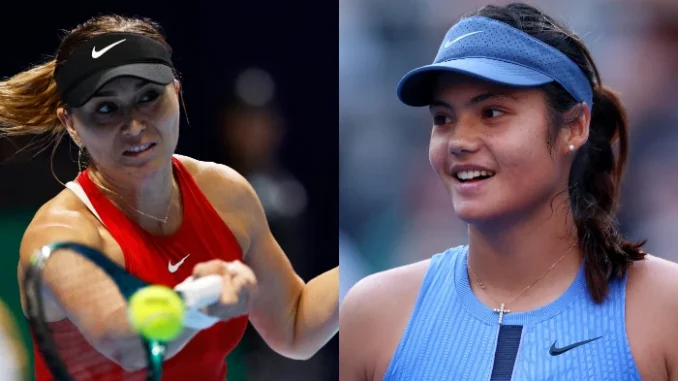
In the bustling heart of Beijing, where the China Open’s bright lights and roaring crowds set the stage for high-stakes tennis, a moment of quiet sincerity unfolded off the court. Paula Badosa, the Spanish star known for her fiery baseline game and unyielding spirit, found herself reflecting not on her own journey but on that of her friend and rival, Emma Raducanu. The 2025 season, a whirlwind of triumphs and trials for both players, had drawn to a close in the Chinese capital, and Badosa’s emotional note to Raducanu captured a bond that transcends the scoreboard—a gesture that resonated deeply with fans and players alike.
The China Open, one of the WTA’s premier events, was a fitting finale for a season that tested the mettle of both women. Raducanu, the 2021 US Open champion, arrived in Beijing carrying the weight of a nation’s expectations. At 22, the Briton has navigated a rollercoaster career since her fairy-tale Flushing Meadows triumph, battling injuries, form dips, and the relentless pressure of her own potential. Her 2025 campaign showed flashes of brilliance—moments where her crisp ball-striking and fearless movement reminded the tennis world why she became a global sensation. Yet, consistency eluded her, and Beijing marked the end of a year where progress, though evident, came in fits and starts. For Badosa, the season was equally complex. The 29-year-old, once ranked as high as No. 2 in the world, has clawed her way back from a 2023 plagued by injuries, including a stress fracture in her back that threatened to derail her career. Her resilience shone through in 2025, with deep runs in tournaments and a renewed hunger that saw her reclaim her place among the WTA’s elite.
As the Beijing tournament wrapped, with neither player hoisting the trophy but both leaving their mark, Badosa took to social media to share a message that cut through the noise of the season’s end. “Em, you’re an inspiration,” she wrote, her words brimming with admiration for Raducanu’s grit. “This year wasn’t easy for either of us, but watching you fight, smile, and keep pushing—it’s something special. Here’s to next season, to more battles, and to our friendship.” The note, shared in the glow of Beijing’s fading tournament lights, wasn’t just a nod to Raducanu’s talent but a recognition of her heart—a quality Badosa, no stranger to adversity, knows well.
Their friendship, forged in the crucible of professional tennis, is a rare gem in a sport often defined by solitary struggles. The two have shared practice courts, swapped stories of setbacks, and celebrated each other’s victories. Badosa, who reached the fourth round in Beijing before falling to a resurgent opponent, has spoken before about the kinship she feels with Raducanu. “We’ve both been through so much,” she said in a press conference earlier in the year, her voice softening. “Emma’s got this fire, you know? She’s young, but she’s been through things that make you grow up fast. I respect that.” Raducanu, for her part, has echoed the sentiment, praising Badosa’s warmth and tenacity. “Paula’s someone who gets it,” she told reporters after a match in 2025. “She knows what it’s like to come back, to doubt yourself, and still show up. That means a lot to me.”
The Beijing stage was more than a tournament for these two—it was a microcosm of their journeys. Raducanu’s matches showcased her trademark flair, with blistering forehands and deft drop shots that thrilled the crowd, even if her results didn’t always match her ambition. Badosa, meanwhile, brought her signature aggression, pounding groundstrokes that echoed her refusal to be defined by past injuries. Their paths didn’t cross on the court this time, but their shared experiences—triumphs marred by setbacks, the weight of expectation, the grind of recovery—wove a silent thread between them. Badosa’s note, penned as the season’s final rallies faded, was a testament to that connection.
For fans, the message was a reminder of the humanity behind the headlines. Tennis, with its gladiatorial battles and relentless schedule, can feel like a solitary pursuit, but moments like these reveal the camaraderie that sustains players through the grind. Raducanu, who has faced scrutiny for everything from her coaching changes to her commercial endorsements, found in Badosa’s words a public affirmation of her resilience. The Spaniard’s gesture also struck a chord with those who’ve followed her own comeback trail—a journey marked by surgeries, sleepless nights, and a stubborn belief that her best days were still ahead.
As the tennis world turns its eyes to 2026, with the Australian Open looming as the next grand stage, Badosa’s note lingers as a beacon of hope. Both players will return to their respective corners of the globe—Raducanu to Kent, Badosa to her roots in Barcelona—to rest, train, and dream of new conquests. The road ahead promises fresh challenges: for Raducanu, a chance to solidify her comeback; for Badosa, an opportunity to climb back toward the top tier. But beyond the rankings and trophies, their friendship stands as a quiet victory—a reminder that in a sport of winners and losers, the bonds forged in shared struggle can be the truest measure of success.
Badosa’s words, simple yet profound, closed the Beijing chapter with a promise of more to come. “Here’s to next season,” she wrote, and in that vow lies the pulse of tennis itself: a game of endless rallies, where every end is a new beginning, and every friendship a reason to keep swinging.
Leave a Reply